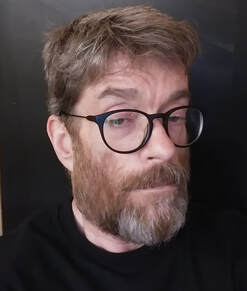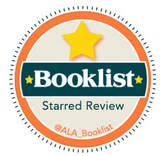 What is the name of the piece that you have in Grabbed? A Brief History in Pink What was the inspiration for your piece? What compelled you to write it? An incredible conversation with Robert Hass at the Miami Book Fair, my own weariness with overt and covert homophobia, allies in private talking as if we were vermin, the pendulum swing of folks succumbing to compassion fatigue as they tire of political correctness, four months of nightmares preceding my lover’s death, a perfect storm of disgust, disappointment, anger, and grief. What compelled you to submit your work for this anthology? Was it a difficult decision? I am, in general, oblivious to publishing opportunities. I used a submission service for a while otherwise I’d have even fewer publishing credits. A trusted friend requested that I send some work. I don’t think I understood the magnitude of the Anthology’s undertaking at the time. It is much bigger than I could have imagined. Had I known then, I probably would have fearfully begged off. Why did you choose this particular form or genre for this piece? It’s a performance piece. A bit of psychodrama. Initially I spread it out over multiple columns and pages with a whole lot of space but that’s not true to the feeling of the piece especially after some drastic cuts (approx one third of the poem). It became a claustrophobic piece and that led to its final utilitarian form. I can’t wait to make the video; it will probably need a seizure warning. Can you speak to the evolution of writing your piece? How long did it take you to write this piece, including revision? Sometimes a rant writes itself. Or seems to. The words and feelings behind them get dammed up until they explode out into the world, a bit like projectile vomiting and possibly in the first draft more therapeutic to the writer than to the reader. The clichéd answer is it took however many years I was old at the time. I don’t fully know how to describe being queer and long term positive in a straight world. I don’t want to demonize the masses but the constant micro and macroaggressions are wearing. I didn’t start the piece with a destination in mind but when the first line wrote itself I knew I was in for a ride. Sometimes large events are like planets that pull everything around themselves into orbit. I’ve been writing AIDS elegies for decades but I couldn’t write a Laramie or a Pulse Nightclub poem, but it turned out I needed to, I needed to mourn the fear and hatred in this world and its many casualties. My lover was shot and killed in March of 2018, I have a memories of him dancing in pink knee high sneakers. He certainly informed this piece but I made him wait for a different poem or two of his own. Revision took the longest, editing for presentation and flow. The poem had a whole other section where the narrator was, in a forced and desperate way, grasping at some sort of peaceful resolution. It stank like the lying, rotting, lifeless thing it was, and eventually I lopped it off in its entirety. Often, editing the line between hope and wishful thinking is the hardest cut for me. One of my personalities is a Goth Pollyanna, but she’s not an accomplished writer. I toyed with cutting some of the more nerdy parts but I am and hope to always be true to my nerd self. I’d love to write a hopeful companion piece, but, now that the Deplorables the world over have shown their hand, I have to figure out how without lying to myself. As a writer, do you feel obliged to share difficult experiences? Yes, definitely. When I was very young I grew up believing that everyone’s life was just like mine. There was the public life with the pretense of “normalcy”, and the private where the threat of physical, emotional, and sexual abuse was a given. Imagine my surprise when I heard and believed the replacement lie: no, this is not universal, this only happens in your house. Abuse thrives in secrecy, isolation, and silence. When I first began writing, I wrote rants and Creative Writing tried its best to suppress that. Just like the home rule of not airing dirty laundry, I was taught to write around trauma, hint at it without calling it out, and move on. Hearing Sharon Olds and Patricia Smith perform live at the first Palm Beach Poetry Festival in 2005 brought me back to my initial writing instincts: expose everything, whoever didn’t want it told shouldn’t have done it, condoned it, or tried to ignore it. Housman echoes the book of Job when he quotes “when your soul is in my soul’s stead.” Even when I was talking around issues I could recognize the person in the audience that fully understood. There is always someone else out there who needs to know that they are not alone. That was true about coming out as queer, as abused, as positive. We don’t need to be ashamed or face it alone. People performing hateful acts need to know that the protection of silence will henceforth be denied. Poets are prophets. Silence=Complicity, Silence=Death. What do you feel the impact of the #MeToo movement has been on your work, if any? Conversation matters. Public discourse matters. When clergy abuse took hold of the national media in the 90s, I found myself crying over the news reports. I needed to write about the constant threat of sexual abuse from the priests and upper classmen during my school days and about systemic schizophrenic hypocrisy. Without the #MeToo movement I don’t think it would have occurred to me to write a poem about being drugged and raped in my early twenties. Growing up around abuse, the rape just seemed like more of the same. At the time, I blamed myself for letting my guard down, and then stuffed the whole experience. Guys don’t get raped, I told myself. Years later near the end of a long term relationship that was dying in part from my partner’s drug addictions I was reminded, oh yes they do. What would you say to another writer who has been uncomfortable or silent about their experience? How can they begin to share their experiences? I have a dear friend who complains about shock poetry, the final line always the coup de grace. It is so tempting for anyone who has been traumatized to write that poem. Processing trauma was where I learned the difference between what I had to write (purge) and what I had to perform. Every writer has to find their own way. That’s what writing is. I had to start with the bare narrative, just the facts, no artifice or ornamentation. For years that’s where I left it. Therapy helped. Writing helped. Eventually I mined my therapeutic purges for my performable art, my first erasures. Patricia Smith shows an amazing matter of fact method of putting the trauma out there in “When the Burning Begins.” In Cenzontle Marcello Hernandez Castillo introduces Daisy, the belt used to beat him, as a recurring character in “Sugar” and other poems. In The Tradition, Jericho Brown addresses rape from a distance in “Ganymede” as well as the comingling of love and abuse in “Prayer of the Backhanded” from Please, as does the amazing Sharon Olds in countless poems. Any on them can serve as an example of where to begin. What else do I say to any other writer? First, save your life. Then excise the tumor as best you can with whatever help you can. Then decide what to do with it. It’s difficult and tearful work but it’s a path toward freedom. Through it all, be kind to yourself. How can a publication such as Grabbed help to empower or heal readers? Children of abuse live in fear, that is our baseline state, and no matter what age the abuse happened there is still part of us that experiences it as a child. The knowledge that we are not alone, that there are others who endured similar or worse, others who just might understand, others who found a way to live and love their life, is a powerful step toward healing. Giving voice to whatever seems too difficult to express is what art does best. Giving ourselves permission to voice it, is an empowering step toward the freedom of healing. Michael Mackin O'Mara is managing editor and co-publisher of SoFloPoJo (the South Florida Poetry Journal), and has been published in Evening Street Review, Visitant, fields magazine, The Body, The Complete HIV/AIDS Resource, and Indolent Book’s HIV Here and Now Project among others. www.michaelmackinomara.com
0 Comments
Leave a Reply. |
Grabbed BlogHave a blog idea for us? Submit it here. Archives
October 2020
Categories |
|
BUY GRABBED
|
If you or anyone you know is a victim of domestic violence, please call The National Domestic Violence Hotline: 1-800-799-7233 1-800-787-3224 (TTY) En Español: 1.800.799.7233 |
 RSS Feed
RSS Feed







